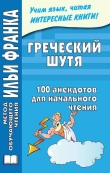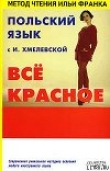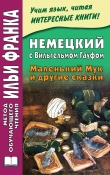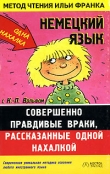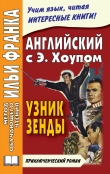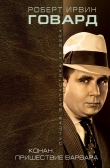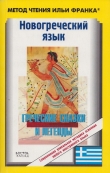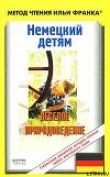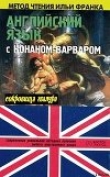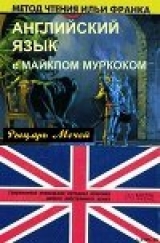
Текст книги "Английский язык с М. Муркоком"
Автор книги: Майкл Джон Муркок
Соавторы: Илья Франк,Андрей Еремин
Жанры:
Языкознание
,сообщить о нарушении
Текущая страница: 28 (всего у книги 36 страниц)
`Arioch decides.
obey [ə (u) ˈbeɪ] unjust [ʌnˈʤʌst] fatalistic [, feɪtəˈlɪstɪk]
`No. It is Mabden time. Arioch commands. He lets the Ragha-da-Kheta live longer because they obey him, because they do not resist him. But soon we shall die.
Corum shook his head.
`Do you not think that Arioch is unjust to destroy you thus?
`Arioch decides.
It occurred to Corum that these people had not once been so fatalistic. Perhaps they, too, were in a process of degeneration, caused by the Knight of the Swords.
`Why should Arioch destroy so much beauty and learning as you have here?
`Arioch decides.
King Temgol-Lep seemed to be more familiar with the Knight of the Swords and his plans than anyone Corum had yet met (казалось, король был лучше знаком с Рыцарем Мечей и его планами, чем кто-либо, встреченный ранее Корумом). Living so much closer to his domain, perhaps they had seen him (живя так близко от его владений, возможно, они /даже/ видели его).
`Has Arioch told you this himself (Ариох сам сказал вам это)?
`He has spoken through our wise ones (он говорил через наших мудрецов).
`And the wise ones – they are certain of Arioch's will (а ваши мудрецы – они уверены в воле = что такова воля Ариоха)?
`They are certain (они уверены).
Corum sighed (вздохнул).
`Well, I intend to resist his plans (что ж, я намерен препятствовать /осуществлению/ его планов). I do not find them agreeable (я не нахожу их приемлемыми = они меня не устраивают)!
King Temgol-Lep seemed to be more familiar with the Knight of the Swords and his plans than anyone Corum had yet met. Living so much closer to his domain, perhaps they had seen him.
`Has Arioch told you this himself?
`He has spoken through our wise ones.
`And the wise ones – they are certain of Arioch's will?
`They are certain.
Corum sighed.
`Well, I intend to resist his plans. I do not find them agreeable!
King Temgol-Lep drew his lids over his eyes and trembled slightly (прикрыл веками глаза и вздрогнул слегка; to draw over – натягивать поверх, накрывать). The warriors looked at him nervously (воины посмотрели на него беспокойно). Evidently they recognised that the king was displeased (очевидно, они понимали, что король недоволен).
`I will speak no more about Arioch (я больше не буду говорить об Ариохе), King Temgol-Lep said. But as our guest we must entertain you (но, как нашего гостя, мы должны развлекать тебя). You will drink some wine with us (ты выпьешь вина с нами).
`I will drink some wine. I thank you.
Corum would have preferred food to begin with (Корум предпочел бы начать с еды = поесть сначала), but he was still cautious of giving offence to the Ragha-da-Kheta (но по-прежнему опасался обидеть рага-да-кета; cautious – осторожный, осмотрительный; to give offence – оскорбить, обидеть), who might yet supply him with the boat he needed (которые могли предоставить ему лодку, в которой он нуждался; to supply with – снабжать).
displeased [dɪsˈpli:zd] entertain [, entəˈtaɪn]
King Temgol-Lep drew his lids over his eyes and trembled slightly. The warriors looked at him nervously. Evidently they recognised that the king was displeased.
`I will speak no more about Arioch, King Temgol-Lep said. But as our guest we must entertain you. You will drink some wine with us.
`I will drink some wine. I thank you.
Corum would have preferred food to begin with, but he was still cautious of giving offence to the Ragha-da-Kheta, who might yet supply him with the boat he needed.
The king spoke to some servants who were waiting in the shadows near the door into the palace (король сказал /что-то/ слугам, ждавшим в тени у двери, /ведущей/ во дворец). They went inside (они вошли внутрь). Soon they returned with a tray on which were tall, thin goblets and a golden jug (вскоре они вернулись с подносом, на котором были высокие тонкие бокалы и золотой кувшин). The king reached out and took the tray in his own hands, balancing it on his knee (король потянулся и взял поднос в свои руки, удерживая его на колене; to balance – сохранять равновесие; качаться). Gravely, he poured wine into one of the cups and handed it to Corum (серьезно = с мрачным видом он налил вино в один из бокалов и подал его Коруму; cup – чаша, кубок). Corum stretched out his left hand to receive the goblet (Корум протянул левую руку, чтобы взять бокал; to receive – получать, принимать).
The hand quivered (рука задрожала).
Corum tried to control it, but it knocked the goblet away (Корум попытался управлять ей, но она отшвырнула бокал; to knock – ударять, бить). The king looked startled and began to speak (король выглядел испуганным, принялся /что-то/ говорить). The hand plunged forward and its six fingers seized the king's throat (рука бросилась вперед, и ее шесть пальцев вцепились в горло короля; to plunge – нырять; бросаться вперед). King Temgol-Lep gurgled and kicked as Corum tried to pull the Hand of Kwll away (король Темгол-Лепа хрипел и дергал ногами, а Корум пытался оторвать/оттянуть руку Кулла; to gurgle – булькать, журчать).
poured [pɔ:d] receive [rɪˈsi:v] gurgled [ˈɡə: ɡld]
The king spoke to some servants who were waiting in the shadows near the door into the palace. They went inside. Soon they returned with a tray on which were tall, thin goblets and a golden jug. The king reached out and took the tray in his own hands, balancing it on his knee. Gravely, he poured wine into one of the cups and handed it to Corum. Corum stretched out his left hand to receive the goblet.
The hand quivered.
Corum tried to control it, but it knocked the goblet away. The king looked startled and began to speak. The hand plunged forward and its six fingers seized the king's throat. King Temgol-Lep gurgled and kicked as Corum tried to pull the Hand of Kwll away.
But the fingers were locked on the throat (но пальцы намертво вцепились в горло; to lock – запирать/ся/; сжимать, стискивать). Corum could feel himself squeezing the life from the king (Корум чувствовал, как он выдавливал жизнь из = как жизнь покидает короля).
Corum shouted for help before he realised that the warriors thought that he was attacking the king on his own volition (Корум громко звал на помощь, пока не понял, что воины думают, будто он нападает на короля по своей воле; volition – волевой акт, воля, хотение). He drew his sword and hacked around him as they attacked with their oddly-wrought clubs (он вытащил меч и размахивал им вокруг себя, когда они нападали /на него/ со своими странно сделанными = причудливыми дубинками; to hack – рубить, разрубать; wrought – выделанный, обработанный; кованый). They were plainly unused to battle, for their actions were clumsy and without proper co-ordination (они явно не привыкли к битве, так как их действия неловкими и без должного согласования = несогласованными).
Suddenly the hand released King Temgol-Lep and Corum saw that he was dead (внезапно рука отпустила короля, и Корум увидел, что он мертв).
His new hand had murdered a kindly and innocent creature (его новая рука убила добродушное и невинное создание)! And it had ruined his chances of getting help from the Ragha-da-Kheta (она уничтожила возможность получить помощь от рага-да-кета; to ruin – разрушить, погубить; chance – шанс, /удобный/ случай, возможность). It might even have killed him, for the warriors were very numerous (она могла бы даже убить и его = лучше бы она убила его, потому что воинов было очень много: «были очень многочисленны»).
Standing over the corpse of the king, he swept his sword this way and that (стоя над трупом короля, он размахивал мечом во все стороны: «туда и сюда»; to sweep – сметать, смахивать), striking limbs from bodies, cutting into heads (отрубая конечности от тел, рубя головы). Blood gushed everywhere and covered him, but he fought on (кровь лилась повсюду и забрызгала его, но он продолжал сражаться; to gush – хлынуть, хлестать, литься потоком).
volition [vəˈlɪʃ (ə) n] clumsy [ˈklʌmzɪ] innocent [ˈɪnəs (ə) nt] numerous [ˈnju:m (ə) rəs]
But the fingers were locked on the throat. Corum could feel himself squeezing the life from the king.
Corum shouted for help before he realised that the warriors thought that he was attacking the king on his own volition. He drew his sword and hacked around him as they attacked with their oddly-wrought clubs. They were plainly unused to battle, for their actions were clumsy and without proper co-ordination.
Suddenly the hand released King Temgol-Lep and Corum saw that he was dead.
His new hand had murdered a kindly and innocent creature! And it had ruined his chances of getting help from the Ragha-da-Kheta. It might even have killed him, for the warriors were very numerous.
Standing over the corpse of the king, he swept his sword this way and that, striking limbs from bodies, cutting into heads. Blood gushed everywhere and covered him, but he fought on.
Then, suddenly, there were no more living warriors (потом вдруг больше не осталось живых воинов). He stood in the courtyard while the gentle sun heat down and the fountain played and he looked at all the corpses (он стоял во внутреннем дворе, мягкое солнце светило, фонтан журчал, и смотрел на все эти трупы; to heat – нагревать/ся/, согревать/ся/; to play – играть, переливаться; бить, извергать /о струе, шланге, фонтане и т. д. /). He raised his gauntleted alien hand and spat on it (он поднял чуждую руку в латной перчатке и плюнул на нее; to spit).
`Oh, evil thing (порождение зла: «злая вещь»)! Rhalina was right (Ралина была права)! You have made me a murderer (ты сделала меня убийцей)!
But the hand was his again, it had no life of its own (но рука снова была его, у нее не было своей собственной жизни). He flexed the six fingers (Корум согнул шесть пальцев). It was now like any ordinary limb (рука была теперь, как любая обычная конечность).
Save for the splashing of the water from the fountain, the courtyard was silent (не считая плескания воды в фонтане, во внутреннем дворе было тихо; save for – за исключением, кроме).
Corum looked back at the dead king and shuddered (Корум оглянулся на мертвого короля и содрогнулся). He raised his sword (поднял меч). He would cut the Hand of Kwll from him (он отсечет себе руку Кулла). Better to be crippled than to be the slave of so evil a thing (лучше покалечиться = стать калекой, чем быть рабом такой злой вещи)!
And then the ground fell away from him and he plunged downwards (затем земля исчезла под ним, и он полетел вниз; to fall away – покидать, исчезать) to fall with a crash upon the back of a beast that spat and clawed at him (упал с грохотом на спину зверя, который плюнул и оцарапал его; to claw – царапать, скрести, рвать когтями).
murderer [ˈmə: dərə] ground [ɡraund] clawed [klɔ:d]
Then, suddenly, there were no more living warriors. He stood in the courtyard while the gentle sun heat down and the fountain played and he looked at all the corpses. He raised his gauntleted alien hand and spat on it.
`Oh, evil thing! Rhalina was right! You have made me a murderer!
But the hand was his again, it had no life of its own. He flexed the six fingers. It was now like any ordinary limb.
Save for the splashing of the water from the fountain, the courtyard was silent.
Corum looked back at the dead king and shuddered. He raised his sword. He would cut the Hand of Kwll from him. Better to be crippled than to be the slave of so evil a thing!
And then the ground fell away from him and he plunged downwards to fall with a crash upon the back of a beast that spat and clawed at him.
CHAPTER THREE (глава третья)
The Dark Things Come (порождения тьмы приходят)
Corum saw daylight above and then the flagstone slid back (Корум видел дневной свет наверху, затем плита сдвинулась обратно; to slide – скользить, плавно двигаться) and he was in darkness with the beast that dwelled in the pit beneath the courtyard (и он остался в темноте со зверем, что обитал в яме под внутренним двором). It was snarling in a corner somewhere (он рычал/ворчал где-то в углу). He prepared to defend himself against it (Корум приготовился защищаться от него).
Then the snarling stopped and there was silence for a moment (потом рычание прекратилось, и на миг наступила тишина).
Corum waited (ждал).
He heard a shuffling (он услышал шарканье /ног/; to shuffle – перемешивать, перемещать; волочить ноги). He saw a spark (увидел искру). The spark became a flame (искра превратилась в пламя). The flame came from a wick that burned in a clay vessel full of oil (пламя исходило от фитиля, который горел в глиняном сосуде, наполненном маслом).
The clay vessel was held by a filthy hand (глиняный сосуд держала грязная рука; filthy – грязный, отвратительный, мерзкий). And the hand belonged to a hairy creature whose eyes were full of anger (рука принадлежала мохнатому существу, глаза которого были наполены гневом).
`Who are you (кто ты)? Corum said.
snarling [ˈsnɑ:lɪŋ] spark [spɑ:k] filthy [ˈfɪlƟɪ]
Corum saw daylight above and then the flagstone slid back and he was in darkness with the beast that dwelled in the pit beneath the courtyard. It was snarling in a corner somewhere. He prepared to defend himself against it.
Then the snarling stopped and there was silence for a moment.
Corum waited.
He heard a shuffling. He saw a spark. The spark became a flame. The flame came from a wick that burned in a clay vessel full of oil.
The clay vessel was held by a filthy hand. And the hand belonged to a hairy creature whose eyes were full of anger.
`Who are you? Corum said.
The creature shuffled again and placed the crude lamp in a niche on the wall (существо пошло, снова шаркая ногами, и поставило грубый светильник в нишу в стене). Corum saw that the chamber was covered in dirty straw (Корум увидел, что /пол/ комнаты покрыт грязной соломой). There was a pitcher and a plate and, at the far end, a heavy iron door (там были кувшин и тарелка и, в дальнем углу, тяжелая железная дверь). The place reeked of human excrement (то место воняло человеческими испражнениями).
`Can you understand me (ты можешь понимать меня)? Corum still spoke the Nhadragh tongue (по-прежнему говорил на надрагском языке).
`Stop your gabbling (хватит тараторить; to gabble – говорить неясно и быстро, бормотать; гоготать). The creature spoke distinctly, as if he did not expect Corum to know what he was saying (существо говорило отчетливо, словно полагало, что Корум не знает, что оно говорит; to expect – ожидать, надеяться; полагать). He had spoken in the Low Speech (оно говорило на упрощенном языке). `You will be like me soon (ты скоро будешь таким, как я).
Corum made no reply (не ответил). He sheathed his sword and walked about the cell, inspecting it (он вложил в ножны меч и прошелся по темнице, осматривая ее; cell – ячейка; тюремная камера; клетка, отсек). There seemed no obvious way of escape (очевидного пути бегства не было = казалось, отсюда не вырваться). Above him he heard footsteps on the flagstones of the courtyard (над собой он услышал шаги по плитам внутреннего двора). He heard, quite clearly, the voices of the Ragha-da-Kheta (он услышал, вполне четко, голоса рага-да-кета). They were agitated, almost hysterical (они были взволнованными, почти истеричными).
niche [nɪʧ] straw [strɔ:] sheathed [ʃi:ðd] hysterical [hɪˈsterɪk (ə) l]
The creature shuffled again and placed the crude lamp in a niche on the wall. Corum saw that the chamber was covered in dirty straw. There was a pitcher and a plate and, at the far end, a heavy iron door. The place reeked of human excrement.
`Can you understand me? Corum still spoke the Nhadragh tongue.
`Stop your gabbling. The creature spoke distinctly, as if he did not expect Corum to know what he was saying. He had spoken in the Low Speech. `You will be like me soon.
Corum made no reply. He sheathed his sword and walked about the cell, inspecting it. There seemed no obvious way of escape. Above him he heard footsteps on the flagstones of the courtyard. He heard, quite clearly, the voices of the Ragha-da-Kheta. They were agitated, almost hysterical.
The creature cocked his head and listened (существо подняло голову и прислушалось).
`So that is what happened (так вот что произошло), he mused, staring at Corum and grinning to himself (проговорил он задумчиво, пристально глядя на Корума и ухмыляясь самому себе = своим мыслям). `You killed the feeble little coward, eh (ты убил этого хилого маленького труса, да; feeble – немощный, хилый; ничтожный)? Hm, well I don't resent your company nearly so much (хм, что ж, мне не будет неприятна твоя компания настолько; to resent – негодовать, возмущаться; не нравиться). Though your stay will be short, I fear (хотя, боюсь, твое пребывание /здесь/ будет недолгим). I wonder how they will destroy you (интересно, как они уничтожат тебя) …
Corum listened in silence, still not revealing that he understood the creature's words (Корум вслушивался в тишину, по-прежнему не показывая, что понимает слова существа; to reveal – открывать, обнаруживать). He heard the sound of the corpses being dragged away overhead (он услышал, как утаскивают трупы наверху). More voices came and went (еще голоса пришли и ушли = раздались и смолкли).
`Now they are in a quandary (теперь они в затруднительном положении), chuckled the creature (хихикнуло создание). `They are only good at killing by stealth (они умеют убивать лишь тайком; to be good at – быть способным к). What did they try to do to you, my friend, poison you (что они попытаются сделать с тобой, мой друг, отравить тебя)? That's the way they usually get rid of those they fear (это способ, /которым/ они обычно избавляются от тех, /кого/ боятся).
coward [ˈkauəd] quandary [ˈkwɔnd (ə) rɪ] stealth [stelƟ]
The creature cocked his head and listened.
`So that is what happened, he mused, staring at Corum and grinning to himself. `You killed the feeble little coward, eh? Hm, well I don't resent your company nearly so much. Though your stay will be short, I fear. I wonder how they will destroy you…
Corum listened in silence, still not revealing that he understood the creature's words. He heard the sound of the corpses being dragged away overhead. More voices came and went.
`Now they are in a quandary, chuckled the creature. `They are only good at killing by stealth. What did they try to do to you, my friend, poison you? That's the way they usually get rid of those they fear.
Poison? Corum frowned (нахмурился). Had the wine been poisoned (не было ли отравлено вино)? He looked at the hand. Had it known (неужели она знала)? Was it in some way sentient (не обладала ли она своего рода предчувствием; sentient – ощущающий, чувствующий)?
He decided to break his silence (он решил нарушить свое молчание).
`Who are you? he said in the Low Speech (он сказал на упрощенном языке).
The creature began to laugh (существо принялось смеяться).
`So you can understand me (значит, ты можешь понимать меня)! Well, since you are my guest, I feel you should answer my questions first (что ж, раз ты мой гость, думаю, тебе следовало бы ответить на мои вопросы сперва). You look like a Vadhagh to me, yet I thought all the Vadhagh perished long since (ты похож на вадага по-моему: «для меня», хотя я думал, все вадаги давно погибли). Name yourself and your folk, friend (назови себя и свой народ, друг).
sentient [ˈsenʃ (ə) nt] laugh [lɑ:f] guest [ɡest]
Poison? Corum frowned. Had the wine been poisoned? He looked at the hand. Had it known? Was it in some way sentient?
He decided to break his silence.
`Who are you? he said in the Low Speech.
The creature began to laugh.
`So you can understand me! Well, since you are my guest, I feel you should answer my questions first. You look like a Vadhagh to me, yet I thought all the Vadhagh perished long since. Name yourself and your folk, friend.
Corum said: `I am Corum Jhaelen Irsei – the Prince in the Scarlet Robe (Принц в Алом Плаще). And I am the last of the Vadhagh (и я последний из вадагов).
`And I am Hanafax of Pengarde (а я – Ганафакс из Пенгарда), something of a soldier, something of a priest, something of an explorer (немного воин, немного жрец, немного исследователь/путешественник) – and something of a wretch, as you see (и немного оборванец, как видишь; wretch – несчастный, жалкий человек). I hail from a land called Lywm-an-Esh – a land far to the West where (я происхожу из страны, называемой Лиум-ан-Эш, – страны, /лежащей/ далеко на западе, где) …
`I know of Lywm-an-Esh. I have been a guest of the Margravine of the East (я был гостем маркграфини восточной /части страны/).
`What? Does that Margraviate still exist (неужели маркграфство все еще существует)? I had heard it had been washed away by the encroaching seas long since (я слышал, его давно смыло наступающими волнами/океаном; to encroach – вторгаться; затоплять)!
`It may be destroyed by now (возможно, оно уничтожено теперь). The Pony Tribes (племена на пони) …
soldier [ˈsəulʤə] priest [pri:st] encroaching [ɪnˈkrəuʧɪŋ]
Corum said: `I am Corum Jhaelen Irsei – the Prince in the Scarlet Robe. And I am the last of the Vadhagh.
`And I am Hanafax of Pengarde, something of a soldier, something of a priest, something of an explorer – and something of a wretch, as you see. I hail from a land called Lywm-an-Esh – a land far to the West where…
`I know of Lywm-an-Esh. I have been a guest of the Margravine of the East.
`What? Does that Margraviate still exist? I had heard it had been washed away by the encroaching seas long since!
`It may be destroyed by now. The Pony Tribes…
`By Urleh (/клянусь/ Урлехом)! Pony Tribes! It is something from the histories (это что-то из историй = легенд).
`How come you to be so far from your own land, Sir Hanafax (как случилось, что ты оказался так далеко от своей страны, сэр Ганафакс)?
`It's a long tale, Prince Corum (это долгая история, принц Корум). Arioch – as he is called here – does not smile on the folk of Lywm-an-Esh (Ариох – как его здесь называют – не благоволит народу Лиум-ан-Эш; to smile on – выказывать благоволение, благоприятствовать). He expects all the Mabden to do his work for him (он ожидает/рассчитывает, что все мабдены будут делать его работу за него) – chiefly in the reduction of the older races, such as your own (в основном, по сокращению численности = уничтожению древних рас, как например, твоей; reduction – снижение, уменьшение; покорение). As you doubtless know, our folk have had no interest in destroying these races, for they have never harmed us (как ты, несомненно, знаешь, наш народ не был заинтересован в уничтожении этих рас, потому что они никогда не причиняли нам вреда). But Urleh is a kind of vassal deity to the Knight of the Swords (но Урлех – нечто вроде вассального божества, /подчиненного/ Рыцарю Мечей). It was Urleh that I served as a priest (Урлеху я служил в качестве жреца).
history [ˈhɪst (ə) rɪ] vassal [ˈvæs (ə) l] deity [ˈdi:ɪtɪ]
`By Urleh! Pony Tribes! It is something from the histories.
`How come you to be so far from your own land, Sir Hanafax?
`It's a long tale, Prince Corum. Arioch – as he is called here – does not smile on the folk of Lywm-an-Esh. He expects all the Mabden to do his work for him – chiefly in the reduction of the older races, such as your own. As you doubtless know, our folk have had no interest in destroying these races, for they have never harmed us. But Urleh is a kind of vassal deity to the Knight of the Swords. It was Urleh that I served as a priest.
Well, it seems that Arioch grows impatient (for reasons of his own) (итак, кажется, Ариох проявляет нетерпение (по каким-то своим причинам)) and commands Urleh to command the people of Lywm-an-Esh to embark on a crusade (и велит Урлеху приказать людям Лиум-ан-Эш предпринять /военный/ поход; to embark on – начинать, приступать к; crusade – поход, кампания; крестовый поход), to travel far to the West where a seafolk dwell (отправиться далеко на запад, где живет морской народ). These folk are only about fifty in all and live in castles built into coral (этих людей всего около пятидесяти, они живут в замках, построенных в коралловых /рифах/; to build into – вделывать, вмуровывать). They are called the Shalafen (называются шалафены). Urleh gave me Arioch's command (Урлех отдал = передал мне приказ Ариоха). I decided to believe that this was a false command (я решил, что это ложный приказ) – coming from another entity unfriendly to Urleh (исходящий от другого существа, недружелюбного к Урлеху). My luck, which was never of the best, changed greatly then (моя судьба, которая никогда не была лучшей = счастливой, изменилась сильно затем). There was a murder (произошло убийство). I was blamed (меня обвинили). I fled my lands and stole a ship (я бежал из своей страны и украл судно; to flee – убегать, спасаться бегством; to steal). After several somewhat dull adventures, I found myself among this twittering people (после нескольких довольно скучных приключений я оказался среди этого щебечущего народа) who so patiently await Arioch's destruction (который так терпеливо ожидает уничтожения Ариохом). I attempted to band them together against Arioch (я попытался объединить их против Ариоха). They offered me wine, which I refused (они предложили мне вина, от которого я отказался). They seized me and placed me here, where I have been for more than a few months (они схватили меня и поместили сюда, где я нахожусь больше нескольких месяцев).
impatient [ɪmˈpeɪʃ (ə) nt] crusade [kru:ˈseɪd] coral [ˈkɔrəl] false [fɔ:ls]
Well, it seems that Arioch grows impatient (for reasons of his own) and commands Urleh to command the people of Lywm-an-Esh to embark on a crusade, to travel far to the West where a seafolk dwell. These folk are only about fifty in all and live in castles built into coral. They are called the Shalafen. Urleh gave me Arioch's command. I decided to believe that this was a false command – coming from another entity unfriendly to Urleh. My luck, which was never of the best, changed greatly then. There was a murder. I was blamed. I fled my lands and stole a ship. After several somewhat dull adventures, I found myself among this twittering people who so patiently await Arioch's destruction. I attempted to band them together against Arioch. They offered me wine, which I refused. They seized me and placed me here, where I have been for more than a few months.
`What will they do with you (что они сделают с тобой)?
`I cannot say (не могу сказать = не знаю). Hope that I die eventually, I suppose (надеются, что умру со временем, /полагаю/). They are a misguided folk and a little stupid, but they are not by nature cruel (они – обманутый народ и немного глупый, но не жестокие по характеру; misguided – введенный в заблуждение; сбитый с курса; by nature – по природе, по характеру). Yet their terror of Arioch is so great that they dare not do anything that might offend him (однако их страх перед Ариохом столь велик, что они не посмеют сделать что-либо, что может обидеть его). In this way they hope he will let them live a year or two longer (таким образом, они надеются, что он позволит им жить еще год-два).
`And you do not know how they will deal with me (ты не знаешь, как они поступят со мной; to deal with – иметь дело, обходиться)? I killed their king, after all (я убил их короля, все-таки).
`That is what I was considering (вот об этом я и думал). The poison has failed (яд не сработал). They would be very reluctant to use violence on you themselves (они вряд ли решатся применить к тебе силу; reluctant – делающий что-либо с большой неохотой). We shall have to see (нам придется /подождать/ и увидеть).
`I have a mission to accomplish (мне нужно выполнить поручение), Corum told him. `I cannot afford to wait (я не могу позволить себе ждать).
Hanafax grinned (Ганафакс усмехнулся).
misguided [mɪsˈɡaɪdɪd] stupid [ˈstju:pɪd] violence [ˈvaɪələns]
`What will they do with you?
`I cannot say. Hope that I die eventually, I suppose. They are a misguided folk and a little stupid, but they are not by nature cruel. Yet their terror of Arioch is so great that they dare not do anything that might offend him. In this way they hope he will let them live a year or two longer.
`And you do not know how they will deal with me? I killed their king, after all.
`That is what I was considering. The poison has failed. They would be very reluctant to use violence on you themselves. We shall have to see.
`I have a mission to accomplish, Corum told him. `I cannot afford to wait.
Hanafax grinned.
`I think you will have to, friend Corum (думаю, тебе придется /подождать/, друг Корум)! I am something of a sorcerer, as I told you (я немного колдун, как я говорил тебе). I have a few tricks, but none will work in this place, I know not why (у меня есть несколько фокусов/трюков, но ни один не сработает в этом месте, не знаю почему). And if sorcery cannot aid us, what can (а если колдовство не может нам помочь, что сможет)?
Corum raised his alien hand and stared at it thoughtfully (Корум поднял свою чуждую руку и посмотрел на нее задумчиво).
Then he looked into the hairy face of his fellow prisoner (потом заглянул в волосатое лицо своего товарища по заключению).
`Have you ever heard of the Hand of Kwll (ты когда-нибудь слышал о Руке Кулла)?
Hanafax frowned (нахмурился).
`Aye… I believe I have (да… думаю, слышал). The sole remains of a God, one of two brothers, who had some sort of feud (единственные останки бога, одного из двух братьев, которые вроде враждовали; feud – длительная, наследственная вражда, междоусобица) … A legend, of course, like so many (легенда, конечно, как и многие /другие/) …
sorcery [ˈsɔ:s (ə) rɪ] feud [fju:d]
`I think you will have to, friend Corum! I am something of a sorcerer, as I told you. I have a few tricks, but none will work in this place, I know not why. And if sorcery cannot aid us, what can?
Corum raised his alien hand and stared at it thoughtfully.
Then he looked into the hairy face of his fellow prisoner.
`Have you ever heard of the Hand of Kwll?
Hanafax frowned.
`Aye… I believe I have. The sole remains of a God, one of two brothers, who had some sort of feud … A legend, of course, like so many…
Corum held up his left hand (Корум показал свою левую руку).
